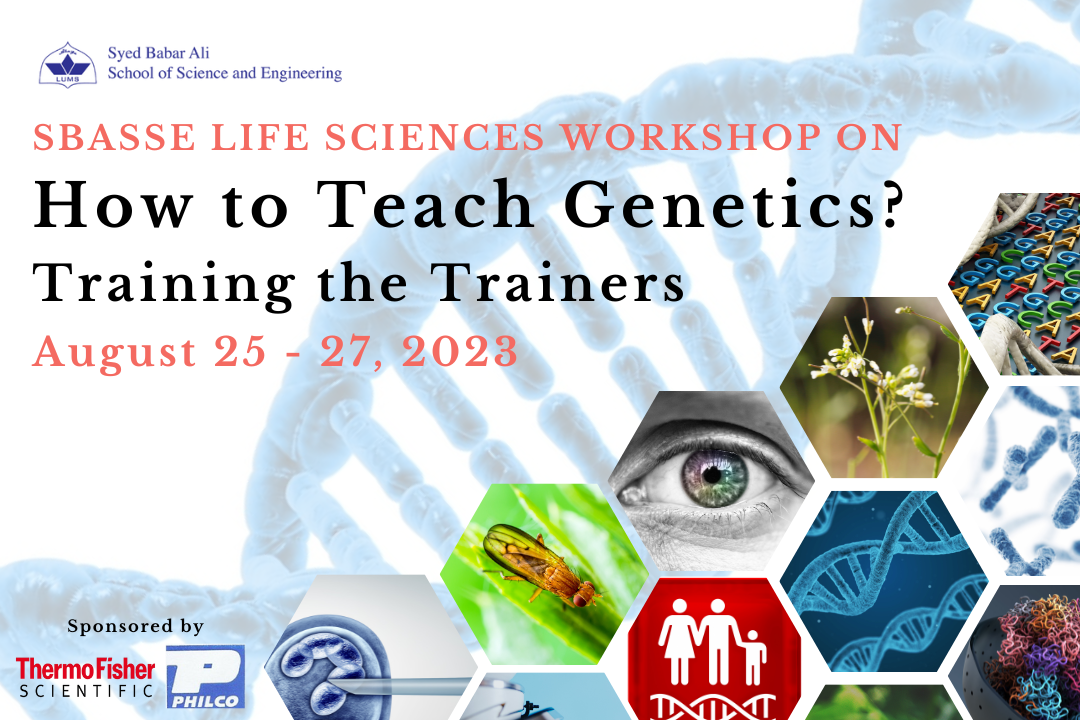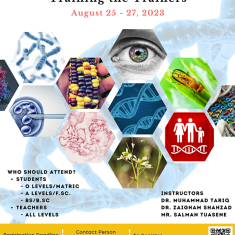How to Teach Genetics?
SBASSE Life Sciences Workshop 2023

Event Date: August 25-27, 2023
Registration Deadline: Aug 06, 2023
Please register at: Click here
Get your Fee Voucher: https://register.lums.edu.pk/
Detailed Program: TBA
The LUMS workshop on genetics offers science students and educators the opportunity to hear lectures and receive teaching resources from leading scientists in the field. Genetics holds the key to understanding trait inheritance, diversity of life, and the mechanisms behind genetic diseases and food security. During this workshop, you will gain a practical understanding of genetics, allowing you to comprehend the intricate processes inside our cells. The principles of heredity will also be discussed, focusing on how traits are transmitted from one generation to another. We will explore inheritance patterns through engaging activities and interactive discussions to help you better understand how they contribute to life's diversity. As a participant in this workshop, you will be engaged in solving intriguing genetic puzzles. To foster critical thinking, scientific inquiry, and a passion for genetics, we aim to provide you with a stimulating and immersive learning experience.
Workshop Topics
- Mendelian Genetics
- Chromosomal theory of inheritance
- Human Genetics
- Genetic Approaches to improve lives
Workshop Cost:
Rs. 15,000 per individual (University students & Teachers)
Rs. 12,000 per individual (School/College students & Teachers)
Accommodation Charges:
Rs. 1,000 per night
Contact Person:
Iqra Manzoor; dlsevents@lums.edu.pk
Speakers
Dr. Tariq is interested in understanding how cell fates are established and how they are maintained during our development. His laboratory works on Polycomb (PcG) and Trithorax group (TrxG) genes which are involved in maintaining epigenetic states of gene expression. Defects in gene regulation by these groups of proteins are linked to different types of cancers. Establishing the molecular link between PcG/TrxG and cell signaling pathways is a primary long-term goal of the epigenetics lab.
Dr. Shahzad is interested in understanding how variation in plant genomes and epigenomes translates to phenotypic variation. This involves developing high-throughput phenotyping, next-generation DNA sequencing, and genetic and epigenetic association mapping methods. The long-term aim of the lab is to employ genome and epigenome editing approaches to improve crop production in normal and stressed environments.
Frequently asked questions
Q1: Who should attend the how to teach genetics workshop?
- Students (O levels/Matric, A levels/F.Sc., early-stage BS/B.Sc.) studying genetics or related fields, such as biology, biotechnology, agriculture, or medicine.
- Educators teaching genetics or looking to incorporate genetics into their curriculum or enhance their teaching methods.
Q2: What topics are covered in the how to teach genetics workshop?
The topics covered in genetics workshops may vary depending on the specific workshop and the target audience. However, common topics include:
- Introduction to basic genetics concepts, including Mendelian principles of heredity, chromosomal theory of inheritance, and fundamental human genetics.
- Applications of genetics in various fields, such as agriculture, medicine, and forensics.
Q3. What is the time commitment
You are expected to spend between 15 and 20 hours total, but your baseline knowledge, note-taking skills, and assessment preparation will determine the amount of time you spend.
Q4. Can participants earn certificates from the Department of Life Sciences, LUMS?
A participant's score determines the level of certification. There are two certification levels
- Certificate of Achievement
- Certificate of Participation
Q5: What are the benefits of attending the how to teach genetics workshop?
Attending how to teach genetics workshop offers several benefits, including:
- Develop a deep understanding of fundamental genetic concepts.
- Interacting with experts or experienced facilitators who can provide valuable insights.
- Networking and collaborating with other participants.
- Gaining a broader perspective and staying updated with the latest trends in genetics.


